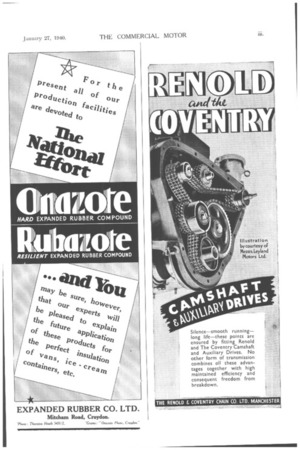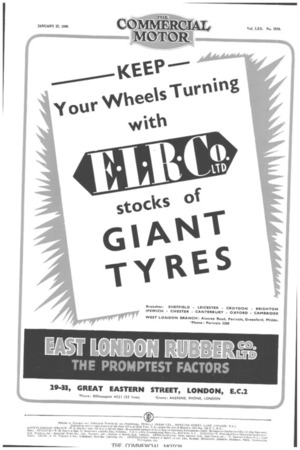OPINIONS and QUERIES
Page 51

Page 52

If you've noticed an error in this article please click here to report it so we can fix it.
OPERATORS AND AGENTS SHOULD BEWARE OF THE JOINTING TRICK.
I HAVE read your recent article on the above subject and desire to inform you that about two months ago two very stylish young women called on me for the purpose of selling jointing.
At the outset I summed them up to be " twists" and treated them accordingly. They had a remarkable vocabulary, and I can quite understand a newcomer to the trade being led " up the garden path " by such fluent orators. However, during the 27 years I have been engaged in passenger transport it has been my policy to draw my supplies only from known firms of repute, and I therefore did not take the bait, although they were very persistent, and in the end I had to be rude to make them leave.
Your journal is certainly doing a-service in periodically guarding the unwary of such frauds.
The story put forward in this ease was that they were selling surplus discs of jointing which had been cut out of the centres of steam-pipe joints by a shipbuilding concern. They had procured these very cheaply. The discs measured about 18 ins, in diameter.
They were very anxious for me to sign an order for a sample lot, but there was nothing doing; they had no
trade card. \N. EM MERSON.
HOW THE REGROOVING OF TYRES EXTENDS THEIR USEFUL LIFE.
WHILST I would endorse the main part of Mr. W. Vir Littlewood's comments on the above subject published in your issue dated January 6, I feel it difficult to agree that "generally speaking, regrooving does not increase mileage." that is to say if safe mileage be under consideration.
It is obvious that regrooving would not increase mileage if the only idea were to run the cover until it is worn down to the case, but the crux of the whole matter is that no wise person ought to run a tyre in this way, and, failing regrooving, the tyre must be discarded for safety's sake long before it is worn out. My contention is that as much as 33i per cent, can be saved on tyre life, and this is amply endorsed by the figures quoted in Mr. Littlewood's letter.
Really, the whole question can be decided by common sense. It is quite useless to regroove a tyre which is worn right out. It is, on the other hand, both economical and efficient to regroove a tyre which still has a good thickness of rubber tread, but is dangerous to use on account of its smoothness.
I may say that certain of the tyre companies have encouraged these views by their own adherence to the principle of regrooving, and I do not think that it would be difficult to obtain conftrmation from tyre users who have had ample experience of regrooving.
Witment FROST, General Manager, Bishop's Stortford. Harvey Frost and Co., Ltd. EVERY HAULIER COULD DO HIS BIT TO HELP THE INDUSTRY.
A LETTER in your issue of January 20, 1939, over
the name of L. Braddick, seeking the reason why manufacturers of commercial vehicles do not start hitting back at the railways is typical of the attitude of lots of haulage contractors to-day. I write with knowledge, because I earn my daily bread selling commercial vehicles.
The solution to the problems facing our industry is, in my opinion, only in the hands of transport users, and particularly the operator under A licence. Lots of very courageous men have tried to weld the haulage contractors of this country into a solid body which could make itself heard against the clamour of the railway vested interests, and, because of the apathy of large numbers, who wait for someone else to fight their battles for them, have so far failed.
Let Mr. Braddick think of the fate of the Bill introduced to Parliament recently by Mr. Morrison, to create monopolies in the milk industry and deprive small retailers of their livelihood. A solid body of retailers said, " Nol " and no it was, very quickly.
We shall shortly see what happens to this Government's agricultural policy when a determined association of farmers speaks its mind.
Think it over, Mr. Braddick, and any other operator who happens to see this. The milkmen's solution is your solution. NORMAN W. SMALL, Branch Manager, Commercial Vehicle Department, Bradford. Central Garage, Ltd.
A READER WHO BACKS UP OUR FIGHTING POLICY.
nURING these days one can never be sure what one will read next, but I wager not one of your readers expected to read in last week's issue Mr. Koop's accusation that The Commercial Motor is guilty of discourtesy in its comments upon railway activities.
Indeed, some of we die-hards—kept in order as we are by your vigilant sub-editing—might incline to the plaint that the journal is over-restrained in this connection. Now Mr. Koop comes along and, upsetting our preconceived ideas, asserts directly the opposite. In truth, the editorial chair can be no bed of roses.
I am nothing so academic as a student of road transport. Up to date (although I view the future with considerable hope) I have not attended the obsequies of any defunct railways. Worse, I brazenly admit that, never having read any, I cannot speak as to the literary standard of railway publications. If taken as a sample, the "square deal" advertisements are quite enough.
It is simply absurd to accuse The Commercial Motor of abusing the railways. As well—and with far greater justice—say that the Insurgents are grossly rude to the Republicans in Spain!
Neither do I think that Mr. Koop would find much, if any, support for his peculiar theory, even among those railway workers who like to keep in touch with a virile competitive industry by reading its principal organ from time to time.
On the contrary. If, in dealing with the world's conflicting idealogies, the lay Press would but adopt the even tempo of your journal, what a help it would be along the difficult road of appeasement. Could not Mr. Koop amend his plaintive charge? Could he not drop the abstract complaint of discourtesy and adopt the material one against the railways of their attempting to take from the public the right to choose its own transport? Could he not find a few condemnatory words to say about the utterly fallacious and vindictive " Snowed Up" railway advertisement?
Let him develop this theme for presentation in the lay Press and he will merit the support of your readers who
take The Commercial Motor not as a tutor on deportment (although they could well do so), but as a champion of their industry.
But it is here that Mr. Koop would meet the ultimate discourtesy of all—his complaint would not be printed.
Bournemouth. J.D.P.
[Thank you, J.D.P., for the nice way in which you have championed the cause of this journal in its defence of road transport. In these days of exaggerated claims amounting, in some instances, almost to insanity, we consider it important to endeavour to view our problems from every angle, even occasionally from what we may term the " detached" standpoint. We try to state our case clearly and logically, supporting it by facts, rather than by making wild statements which would merely provide targets for our opponents. Big headlines and sweeping assertions may easily add undue emphasis to matters of comparatively little importance and thus detract from the value of others which really deserve a large measure of attention.—ED.]




















































































